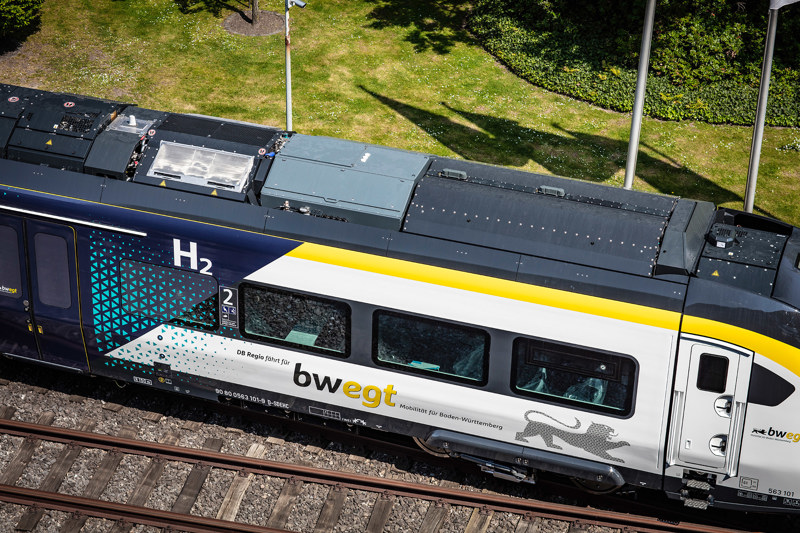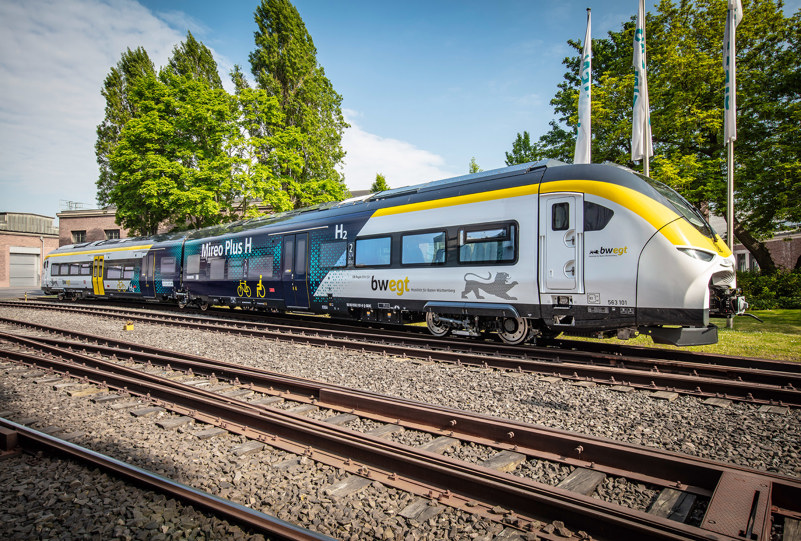The two companies are working together to develop the hydrogen train and the appropriate infrastructure to replace diesel multiple units in regional transport and reduce CO2 emissions on the rails to zero.
The Mireo Plus H hydrogen train consists of a fuel cell and a lithium-ion battery. According to Siemens Mobility, the train “will be as powerful as electric multiple units” with a high drive power of 1.7 MW for up to 1.1 m/s² acceleration and a top speed of up to 160 km/h. A two-car version will have a range of up to 800 km, while a three-car will have a range of 1,000 km.
The refuelling process for the train will take no longer than refuelling a diesel unit, according to DB. For the filling station, hydrogen will be produced by DB Energie through electrolysis at the DB plant in Tübingen.
Green electricity required for this will come directly from the overhead contact line. The hydrogen will be stored in a mobile storage system and before refuelling it will be processed and cooled. The mobile structure enables further test projects on previously undeveloped routes, DB notes. Meanwhile, DB Regio’s workshop in Ulm is being converted for the maintenance of the hydrogen trains.
According to DB and Siemens Mobility, using the H2goesRail project as an example, the departure from diesel will result in savings of around 330 tonnes of CO2 per year on the route between Tübingen and Pforzheim. In general, depending on the route profile, the Mireo Plus H can save 520 tons per year (calculated on 200,000 km of mileage).
A two-car Mireo Plus H will start test drives in Baden-Württemberg in 2023. From 2024, it will be used for the H2goesRail project in regular passenger operations between Tübingen, Horb and Pforzheim, replacing a diesel railcar running there. Approximately, 120,000 km of scheduled railway operations are planned.

“In the coalition agreement, the Federal Government [in Germany] has agreed to electrify 75% of the rail network by 2030,” said Michael Theurer, Parliamentary State Secretary at the BMDV and Federal Government Commissioner for Rail Transport. “Alternative drives can help to reduce emissions from diesel traffic by rail. In this way, we can also drive almost climate-neutral on routes where full electrification is not possible. With H2goesRail, a project is being implemented that will not only test the use of hydrogen for rail, but also substantially advance it.”
Michael Peter, CEO of Siemens Mobility, added, “Only with a strong rail and alternative drive system will we be able to make a significant contribution to combating climate change. The Mireo Plus H enables climate-friendly and emission-free passenger transport. With the Mireo Plus H, we have developed the next generation of hydrogen trains that offer a particularly long range and higher acceleration. Each train delivered can save up to 45,000 tonnes of CO2 over a service life of 30 years compared to corresponding car journeys.”
Dr Daniela Gerd tom Markotten, member of the board of management for digitalization & technology at Deutsche Bahn, concluded, “Hydrogen trains are an important building block for Deutsche Bahn on the way to climate neutrality. With our development of the mobile hydrogen filling station and the associated maintenance infrastructure, we are showing that we at DB can not only achieve mobility, but also technology. And this is exactly what is needed for the climate-friendly transport of tomorrow. Together with Siemens and the newly developed hydrogen train, we are creating an overall system that will take us a further step towards phasing out diesel and enable the fleet to be greened.”
The H2goesRail project is funded with a total of €13.74 million by the Federal Ministry for Digital and Transport (BMDV) as part of the National Innovation Programme for Hydrogen and Fuel Cell Technology in Germany.

